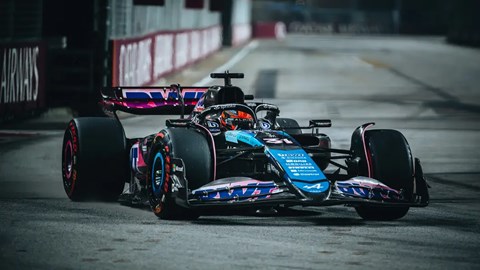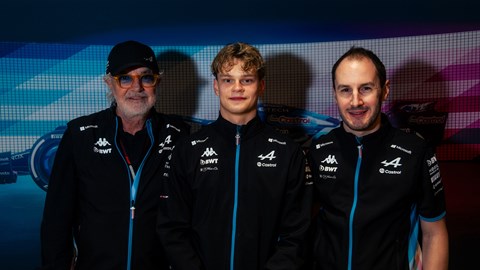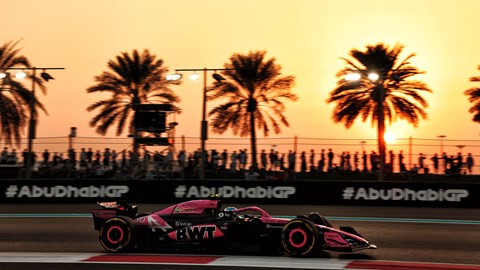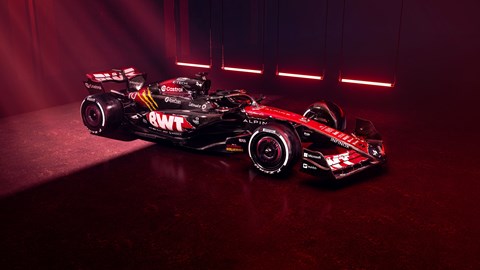► Alpine’s mixed 2024
► The return Flavio Briatore
► What’s next for Enstone?
The Alpine Formula 1 team has had a mixed 2024: it failed dismally in the first part of the year before a strong uptick in the last handful of races – most notably a double podium in Brazil. As a result the team finished an encouraging 6th with 65 points, despite its struggles.
However, poor results were only responsible for a fraction of the negative headlines earlier in the year. The most recent is the planned closure of its engine programme at the end of next year and becoming a customer of rival brand Mercedes, part of a strategic overhaul.
Since Renault’s return to F1 team ownership in 2016 after six years as an engine supplier, it has underachieved. Five-year plans, 100-race plans… its rebranding as Alpine in 2021 and repeated management changes made no difference to a team that has languished in the midfield and taken just one lucky win in Hungary in 2021. This latest overhaul is seen by many in the F1 paddock as the endgame rather than a fresh start.
The key change is the most controversial. In June, Alpine announced Flavio Briatore’s return as ‘Renault Group CEO Luca de Meo’s executive advisor for the Formula 1 division’ – team boss in all but name.
This was so extraordinary because Briatore’s last stint at Renault, as team principal, ended when the 2008 Singapore Grand Prix scandal was exposed. Bringing back the man who oversaw F1’s biggest race-fixing controversy, with Nelson Piquet Jnr deliberately crashing to trigger a safety car that allowed team-mate Fernando Alonso to win, was a shock. But Briatore was appointed to implement de Meo’s vision. That means closing its engine operation at its Viry-Chatillon facility outside Paris.

‘The stuff with the engine was decided already by the management of Renault and for me it’s fine,’ said Briatore in late August. ‘Our chairman decided it was fine. This was decided before I arrived in the team.’
De Meo says the team is not for sale and Briatore echoes that, insisting: ‘Luca de Meo never wants to sell the team, question finito.’ Yet there are persistent whispers that it is the plan, with 2016 F1 world champion Nico Rosberg even claiming in TV commentary that he’s been offered the chance to invest.
Closing the engine programme detaches the F1 operation from Renault, making any sale more straightforward. The official reasoning is competitive pragmatism and the desire to reallocate resources at its Viry base to road-car projects. Yet the Alpine workers’ council fighting the closure of the engine programme claims ‘the stated reason is significant direct cost savings, replacing €120 million in development costs with €17 million in annual supply costs’.
Alpine’s UK chassis base and the French engine facility have never been properly integrated. Each side persistently blames the other.

‘Since 2022, the power unit has accounted for approximately 20 per cent of the total performance deficit of the car,’ says the Alpine workers’ council statement. ‘The rest is due to the Enstone factory chassis, which struggles to improve amid successive leadership changes.’
The engine is roughly 25bhp down on its rivals, but the chassis started the season overweight and short of downforce. While the car is now on the weight limit it’s only good enough to pick up occasional ninth places.
The common thread is Renault’s ownership. It underestimated what it takes to win in F1 and is responsible for near-constant management instability.
It all points to a sale, but not necessarily a quick one, as Renault is willing to press on to F1’s new regs in 2026. A leap forward might tempt it to stay in control, and while Briatore takes care of the big picture, he’s appointed well-regarded 36-year-old Oliver Oakes as team principal.
‘Since 2022, the power unit has accounted for approximately 20 per cent of the total performance deficit of the car,’ says the Alpine workers’ council statement. ‘The rest is due to the Enstone factory chassis, which struggles to improve amid successive leadership changes.’
The engine is roughly 25bhp down on its rivals, but the chassis started the season overweight and short of downforce. While the car is now on the weight limit it’s only good enough to pick up occasional ninth places.
The common thread is Renault’s ownership. It underestimated what it takes to win in F1 and is responsible for near-constant management instability.
It all points to a sale, but not necessarily a quick one, as Renault is willing to press on to F1’s new regs in 2026. A leap forward might tempt it to stay in control, and while Briatore takes care of the big picture, he’s appointed well-regarded 36-year-old Oliver Oakes as team principal.

Whatever happens, Renault has a valuable asset in the growing F1 economic bubble. Last year, it sold a 24 per cent stake to a consortium of investors including Deadpool star Ryan Reynolds for €200m – and the team’s value has only risen since then.
Briatore’s appointment is logical only if sale is the objective. And as an old-school wheeler-dealer, he knows that to maximise your price the last thing you want to do is admit you’re interested in selling…